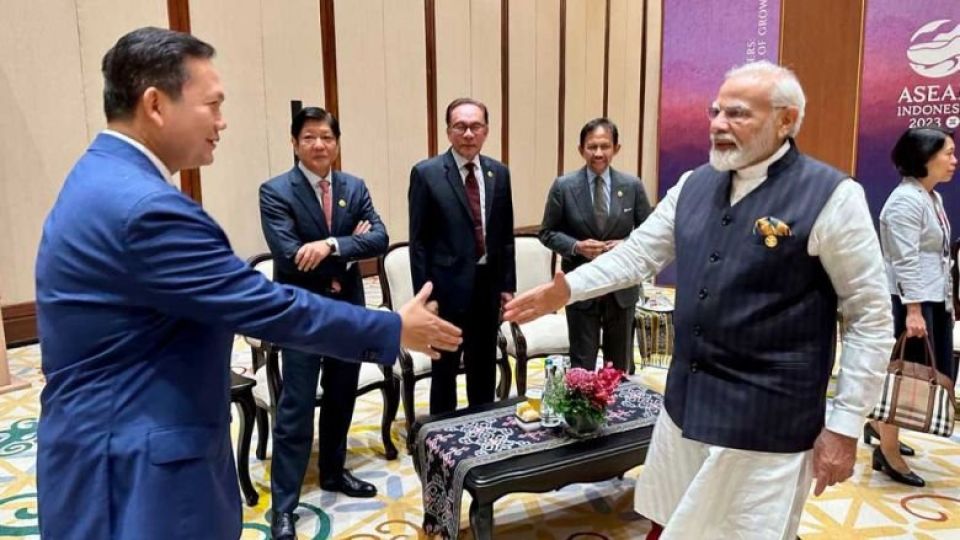September 8, 2023
PHNOM PENH – ASEAN leaders have renewed their pledge to maintain peace, security and stability in the region, particularly amid escalating issues over the Indo-Pacific, South China Sea, Korean Peninsula, Myanmar and Ukraine.
The commitment was solidified at the 43rd ASEAN Summit chaired by Indonesian President Joko “Jokowi” Widodo, held under the theme “ASEAN Matters: Epicentrum of Growth”.
“In accordance with universally recognised principles of international law, including the 1982 UN Convention on the Law of the Sea (UNCLOS), we remain committed to resolving disputes peacefully without resorting to the threat or use of force,” said a September 6 joint statement.
It stressed the importance of sustaining an ASEAN-centric approach to foster an open, inclusive, transparent and resilient regional framework. This would be in line with international law and promote stronger cooperation with both dialogue and external partners.
The summit also underscored the importance of regionalism and multilateralism, referencing key guiding documents such as the UN and ASEAN charters, the Declaration on Zone of Peace, Freedom and Neutrality (ZOPFAN), the 1976 Treaty of Amity and Cooperation in Southeast Asia (TAC), UNCLOS, the Treaty on the Southeast Asia Nuclear Weapon-Free Zone (SEANWFZ), the 2011 Declaration on the East Asia Summit on the Principles for Mutually Beneficial Relations and the ASEAN Outlook on the Indo-Pacific (AOIP).
It stated that the principles enshrined in these foundational documents serve to strengthen ASEAN’s collective efforts to address the multifaceted challenges faced both regionally and globally.
ASEAN outlook on the Indo-Pacific
ASEAN leaders have expressed concern over escalating geopolitical tensions in the region and beyond. They emphasised the importance of the AOIP in maintaining peace, stability and prosperity.
“It will be at the forefront of our engagement with partners to foster mutual trust, respect and benefit through ASEAN-led mechanisms,” said the official statement.
The leaders are committed to implementing the AOIP through specific projects and activities aligned with its objectives and principles. They also welcomed the organisation of the ASEAN-Indo-Pacific forum.
“We welcome enhanced cooperation between the AOIP and initiatives from dialogue partners in the Indo-Pacific through ASEAN-led platforms such as ASEAN Plus One, ASEAN Plus Three, the East Asia Summit (EAS), and the ASEAN Regional Forum (ARF),”added the statement.
South China Sea
The leadership of ASEAN also addressed growing concerns over the situation in the South China Sea. The summit highlighted member states’ apprehensions regarding land reclamations, activities and incidents that have eroded trust, increased tensions and risked peace and security in the region.
“We reaffirmed the need for mutual surety and self-restraint to prevent any actions that could further escalate the situation,” the statement said.
It emphasised the importance of peaceful resolution of disputes in line with international law, including UNCLOS.
The leaders also highlighted the significance of non-militarisation and called for all states to exercise self-restraint.
“Maintaining peace, security and freedom of navigation in the South China Sea is crucial,” they added.
ASEAN member states acknowledged the importance of implementing the Declaration on the Conduct of Parties in the South China Sea (DOC) in full. They welcomed progress in the ongoing negotiations for a Code of Conduct in the South China Sea (COC), notably the completion of the second reading of the Single Draft COC Negotiating Text (SDNT) and the adoption of guidelines aimed at expediting a substantive and effective COC.
Developments on the Korean Peninsula
The bloc leaders also emphasised the need for ongoing peaceful dialogue among all relevant parties to achieve enduring peace and stability and a denuclearised Korean Peninsula. The recent escalations of North Korea’s intercontinental ballistic missile tests and increased tensions in the region have raised serious concerns about regional stability.
The leaders urged all parties to re-engage in peaceful talks and continue striving for long-term peace and a Korean Peninsula free of nuclear weapons. They confirmed their commitment to the full enforcement of all pertinent UN Security Council (UNSC) Resolutions, while acknowledging global efforts aimed at the complete, verifiable and irreversible removal of nuclear weapons on the peninsula in a peaceful manner.
“Diplomatic efforts, including creating a conducive environment for peaceful dialogue among all involved parties, should remain a priority,” said the statement.
It added that the intergovernmental organisation is prepared to play a constructive role in fostering a favourable atmosphere for dialogue, particularly through ASEAN-led platforms such as the ARF.
Developments in Myanmar
ASEAN leaders strongly criticised the ongoing violence in Myanmar and its impact on regional stability during their summit, which also focused on the lack of progress in implementing the Five-Point Consensus (5PC) aimed at resolving the country’s ongoing political crisis.
“The 5PC remains ASEAN’s primary framework for addressing Myanmar’s political crisis. We are deeply concerned by Myanmar authorities’ failure to make significant progress, despite their commitment in April 2021,” said the statement.
The summit acknowledged the efforts of the rotating ASEAN chair and the Special Envoy’s office in pushing for 5PC implementation. They welcomed the chair’s comprehensive report assessing the situation.
Regarding next steps, the summit endorsed its own review and future decisions related to the 5PC implementation.
“We remain committed to a sustainable and comprehensive approach to assist Myanmar in finding lasting solutions,” the statement added.
Situation in Ukraine
The summit stressed its ongoing commitment to Ukraine’s sovereignty, political independence and territorial integrity, while also urging adherence to the UN Charter and international law.
“We highlighted the urgent need for an immediate end to hostilities and sincere engagement in dialogue to peacefully resolve the conflict,” the statement read.
The summit backed the efforts of the UN secretary-general in finding a peaceful solution and called for swift, safe and unrestricted humanitarian access to aid those in need in Ukraine. It also emphasised the importance of protecting civilians, humanitarian workers and vulnerable individuals.


